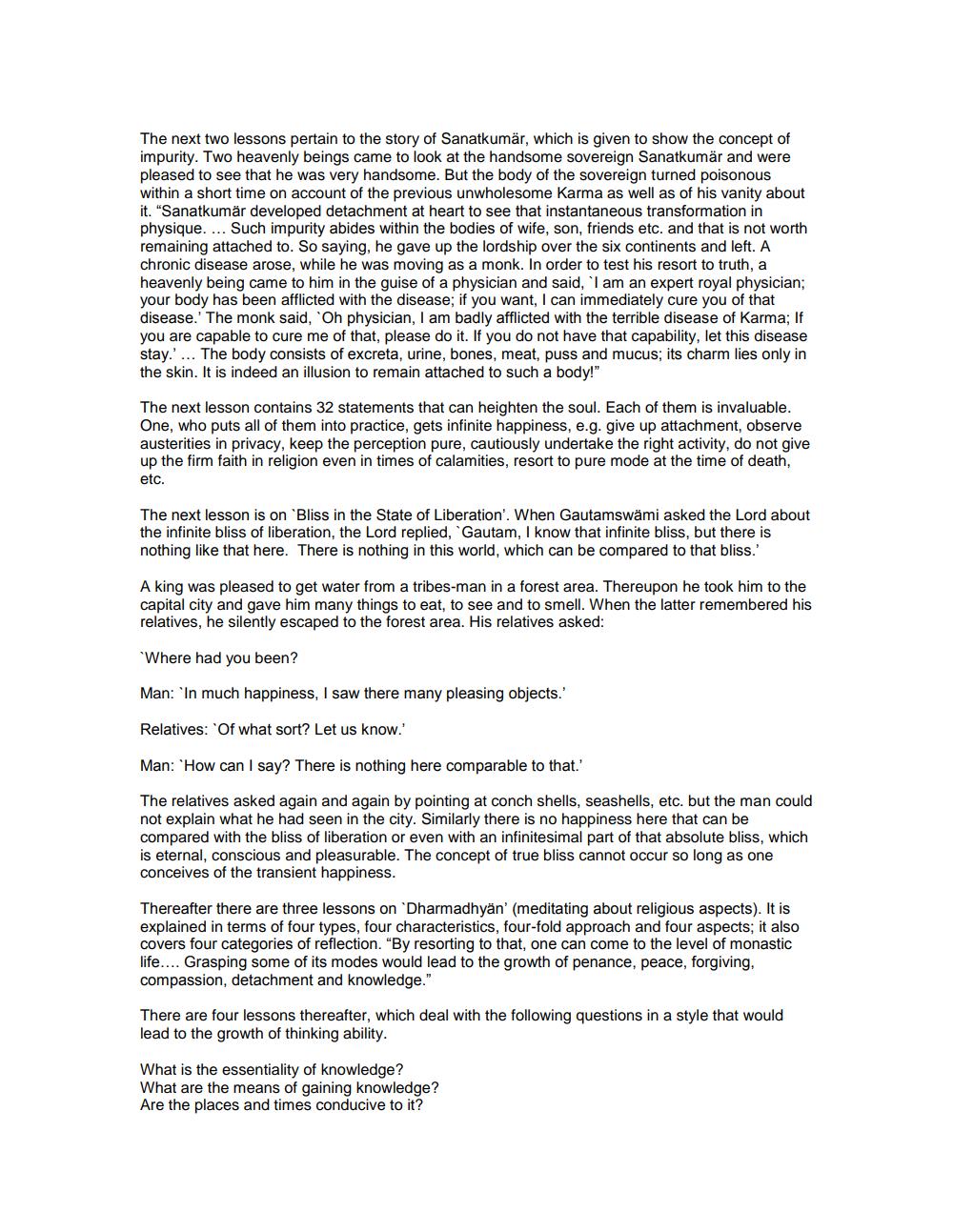________________
The next two lessons pertain to the story of Sanatkumär, which is given to show the concept of impurity. Two heavenly beings came to look at the handsome sovereign Sanatkumar and were pleased to see that he was very handsome. But the body of the sovereign turned poisonous within a short time on account of the previous unwholesome Karma as well as of his vanity about it. "Sanatkumär developed detachment at heart to see that instantaneous transformation in physique. ... Such impurity abides within the bodies of wife, son, friends etc. and that is not worth remaining attached to. So saying, he gave up the lordship over the six continents and left. A chronic disease arose, while he was moving as a monk. In order to test his resort to truth, a heavenly being came to him in the guise of a physician and said, 'I am an expert royal physician; your body has been afflicted with the disease; if you want, I can immediately cure you of that disease.' The monk said, Oh physician, I am badly afflicted with the terrible disease of Karma; If you are capable to cure me of that, please do it. If you do not have that capability, let this disease stay.' ... The body consists of excreta, urine, bones, meat, puss and mucus; its charm lies only in the skin. It is indeed an illusion to remain attached to such a body!"
The next lesson contains 32 statements that can heighten the soul. Each of them is invaluable. One, who puts all of them into practice, gets infinite happiness, e.g. give up attachment, observe austerities in privacy, keep the perception pure, cautiously undertake the right activity, do not give up the firm faith in religion even in times of calamities, resort to pure mode at the time of death, etc.
The next lesson is on "Bliss in the State of Liberation'. When Gautamswämi asked the Lord about the infinite bliss of liberation, the Lord replied, 'Gautam, I know that infinite bliss, but there is nothing like that here. There is nothing in this world, which can be compared to that bliss.'
A king was pleased to get water from a tribes-man in a forest area. Thereupon he took him to the capital city and gave him many things to eat, to see and to smell. When the latter remembered his relatives, he silently escaped to the forest area. His relatives asked:
"Where had you been?
Man: 'In much happiness, I saw there many pleasing objects.'
Relatives: 'Of what sort? Let us know.'
Man: "How can I say? There is nothing here comparable to that.'
The relatives asked again and again by pointing at conch shells, seashells, etc. but the man could not explain what he had seen in the city. Similarly there is no happiness here that can be compared with the bliss of liberation or even with an infinitesimal part of that absolute bliss, which is eternal, conscious and pleasurable. The concept of true bliss cannot occur so long as one conceives of the transient happiness.
Thereafter there are three lessons on 'Dharmadhyan' (meditating about religious aspects). It is explained in terms of four types, four characteristics, four-fold approach and four aspects; it also covers four categories of reflection. "By resorting to that, one can come to the level of monastic life.... Grasping some of its modes would lead to the growth of penance, peace, forgiving, compassion, detachment and knowledge."
There are four lessons thereafter, which deal with the following questions in a style that would lead to the growth of thinking ability.
What is the essentiality of knowledge? What are the means of gaining knowledge? Are the places and times conducive to it?




